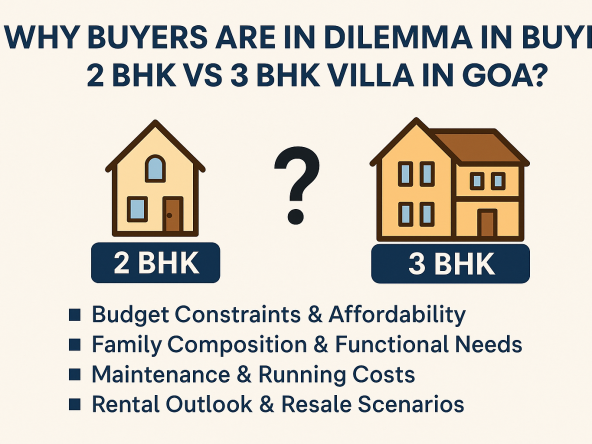Buying property in Goa can be a rewarding investment, but it’s important to conduct thorough due diligence to avoid potential pitfalls. Here’s a checklist of things to consider and verify before purchasing property in Goa:
1. Property Title and Ownership
- Clear Title: Ensure the property has a clear title, meaning there are no legal disputes or claims against it. Verify the ownership documents to confirm that the seller has the legal right to sell the property.
- Title Search: Conduct a title search for the last 30 years or more to ensure there is no litigation or encumbrance on the property. This search can be done at the Sub-Registrar’s office.
- Mutation of Property: Check if the property has been mutated (transferred) in the name of the seller in the local municipal records, which is essential for establishing the legal owner.
2. Encumbrance Certificate
- Encumbrance Certificate (EC): Obtain an Encumbrance Certificate from the Sub-Registrar’s office. This document certifies that the property is free from any legal or monetary liabilities, such as loans or mortgages.
3. Zoning Regulations and Land Use
- Zoning Laws: Ensure that the property complies with the zoning regulations of the area. Certain zones, especially in coastal and agricultural areas, have restrictions on construction and development.
- Land Use Permissions: Verify that the land is designated for residential, commercial, or mixed-use as per your intended use. Agricultural land, for example, cannot be used for residential or commercial purposes unless converted legally.
4. Approvals and Permissions
- Construction Approvals: If buying a constructed property, check if all necessary approvals and licenses have been obtained, including building plans sanctioned by the local municipal authority and Coastal Regulation Zone (CRZ) clearance, if applicable.
- NOC from Authorities: Ensure that the property has No Objection Certificates (NOC) from various authorities such as the local municipal corporation, electricity board, and water department.
5. Development Regulations
- Construction Norms: Confirm that the property adheres to the state’s construction norms and regulations, such as the permissible Floor Area Ratio (FAR) and building height restrictions.
- Occupancy Certificate: For newly constructed properties, check for an Occupancy Certificate (OC), which confirms that the building has been constructed as per approved plans and is fit for occupancy.
6. Check for Encroachments
- Physical Inspection: Conduct a thorough physical inspection of the property to ensure there are no encroachments or unauthorized constructions on the land.
- Survey Plan: Cross-check the property boundaries with the survey plan and cadastral maps from the local revenue department.
7. Verify Seller’s Identity and Authority
- Seller’s Identity: Verify the identity and legal standing of the seller. If the seller is a company, trust, or partnership, ensure they have the authority to sell the property and that all necessary resolutions and documents are in place.
- Power of Attorney: If the seller is acting through a Power of Attorney (POA), ensure the POA is valid, registered, and specifically grants the authority to sell the property.
8. Check for Pending Dues
- Utility Dues: Ensure there are no outstanding dues for utilities such as water, electricity, and maintenance charges.
- Property Tax: Verify that the property taxes have been paid up to date. Request copies of recent property tax receipts from the seller.
9. Local Laws and Restrictions
- Portuguese Civil Code: Goa is governed by the Portuguese Civil Code, which has unique provisions regarding inheritance and property ownership. Understand how these laws might impact your property purchase, especially if the property is jointly owned or inherited.
- Non-Resident Indian (NRI) Regulations: If you are an NRI, be aware of specific regulations governing property purchases by NRIs in India. Ensure compliance with the Foreign Exchange Management Act (FEMA).
10. Verify Builder Credentials (if buying under construction property)
- Builder’s Reputation: Research the builder’s track record for timely delivery, quality of construction, and adherence to commitments.
- RERA Registration: Ensure that the property is registered with the Real Estate Regulatory Authority (RERA), which provides transparency and protection to buyers in under-construction projects.
11. Get a Professional Legal Opinion
- Hire a Lawyer: It is advisable to hire a local lawyer who specializes in real estate transactions in Goa. They can help review documents, perform due diligence, and ensure all legal requirements are met.
12. Check for Resale Restrictions and Lock-in Periods
- Resale Conditions: Some properties, especially in gated communities or developments with amenities, may have resale restrictions or lock-in periods. Check if there are any conditions that affect your ability to sell the property in the future.
13. Negotiate Terms and Conditions
- Payment Terms: Clearly negotiate and document the payment terms, including the amount, schedule, and penalties for delay. Ensure all transactions are documented and receipts are obtained.
- Sale Agreement: The sale agreement should include all essential details, including the property description, price, payment terms, possession date, and any conditions of sale.
Conclusion
Purchasing property in Goa requires thorough research and careful consideration of various legal and regulatory aspects. By following this checklist and seeking professional assistance, you can minimize risks and ensure a smooth and secure property transaction.



